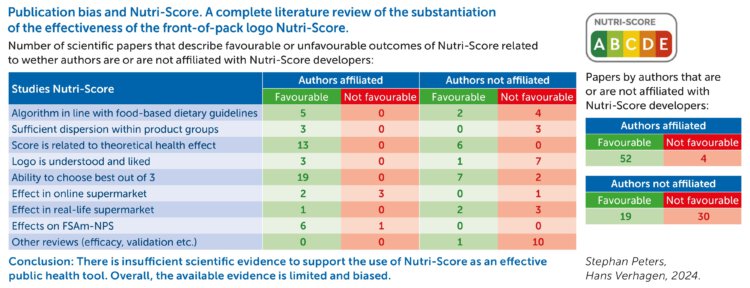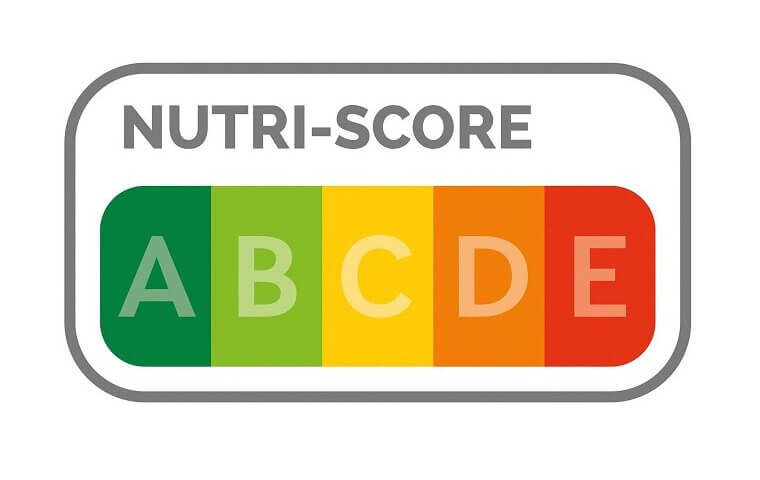
Majority of studies in favour of Nutri-Score carried out by its developers, say researchers
A new study by researchers in the Netherlands has reviewed all available scientific research on Nutri-Score and found that “the majority of studies on Nutri-Score were conducted by authors who are employed at or connected with its developers” at the EREN institute in France. Almost all of these were favourable towards Nutri-Score. Conversely, the majority of studies evaluating Nutri-Score with an unfavourable outcome were conducted by experts who are independent, i.e. not employed by or connected to its developers.
“Nutrition scientists are divided, with some supportive and others in complete opposition to Nutri-Score’s usefulness as a tool to combat diet-related diseases in Europe. Strikingly, our findings suggest that a scientific evaluation of Nutri-Score is directly affected by his or her professional links to the Nutri-Score developers. Favourable opinions of Nutri-Score come mainly from scientists employed by or associated with the developers, while the majority of independent scientists unaffiliated to Nutri-Score, are unfavourable. This suggests bias in peer-reviewed articles accepted for publication.” said Dr. Stephan Peters, co-author of the study and manager of nutrition, health and sustainability at the Dutch Dairy Association (NZO).
Conclusions Nutri-Score studies subject to publication bias
The researchers reveal that of the 56 studies of Nutri-Score performed by authors employed or connected with its developers, 52 were in favour of the system. Whereas, of the 49 studies conducted by independent and unaffiliated researchers, 61 per cent have an unfavourable outcome to Nutri-Score. The authors say that this demonstrates that “conclusions of studies and publications on Nutri-Score are subject to publication bias.” The researchers note the WHO / IARC report which supported the science behind Nutri-Score was also authored by developers of Nutri-Score.
No study in real-life supermarket
The authors Dr. Stephan Peters and Prof.Dr. Hans Verhagen, both former members of the scientific committee of Dutch front-of-pack logo ‘Het Vinkje’, also looked for supportive scientific evidence that Nutri-Score guides shoppers to healthier purchases in a real-life supermarket trial, or that a direct cause-and-effect link could be made between Nutri-Score and positive health changes. However, they found that no study exists on the application of Nutri-Score in a real-life supermarket, and on a
complete supermarket range. Instead, they found studies that suggest Nutri-Score improves shoppers’ habits are based on online experiments and on a limited range of supermarket products.
“…the golden bullet studies to determine the efficacy of Nutri-Score are based on the effect of real-life supermarket purchases based on receipts and the effect on the algorithm. Unfortunately, no such study exists”, say the researchers.
Independent scientific evaluation by EFSA
“There is insufficient evidence to support a theoretical health claim, or the use of Nutri-Score as an effective public health tool. What we find is the available evidence is limited and biased. European consumers need proper scientific evaluation on Nutri-Score, conducted by independent researchers unaffiliated to developers of the system, and in real-life settings. Therefore, we strongly plea for an independent scientific evaluation of Nutri-Score by a body such as the European Food Safety Authority, in the same way as EFSA evaluates health claims on products.”, said Prof.Dr. Hans Verhagen, co-author and former member of the EFSA NDA Panel.

Full research study: https://www.sciencedirect.com/science/article/pii/S2213434424000069
Press Release (EN): Press Release Publication Bias Nutri-Score
Highlights and abstracts (EN): Highlights and Graphical Abstract Publication Bias Nutri-Score





